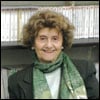The Jerusalem municipality this week named a street after Rabbi Eliezer Nanas, who endured imprisonment at the hands of Soviet authorities and, later in life, tutored thousands of students in Israel's capital. In a ceremony attended by Rabbi Zeev Slonim, rabbi of central Jerusalem, the municipality unveiled Maaleh Harav Nanas, which translates to "Rabbi Nanas Ascent."
Nanas, who passed away 10 years ago in Jerusalem, was born in 1897 in Kherson, Ukraine. After completing his studies, he became an accountant, a job which allowed him to secretly support the Lubavitch underground yeshiva network in the Soviet Union. He helped provide food to the yeshiva students and also was instrumental in obtaining financial support for the teachers' salaries.
Later, he secured an agreement with a small town mayor in the vicinity of Rostov-on-Don, Russia, whereby students could learn in his jurisdiction even though the town had no Jews of its own. The students learned there for eight years without the Communist authorities discovering the yeshiva.
Nevertheless, Nanas spent a total of 20 years in Soviet prisons for actions deemed counterrevolutionary, an experience he recounted in Subbota under the pseudonym of Avraham Netzach. Among other charges, Nanas earned particularly harsh punishment for possessing letters proving his correspondence with the Sixth Lubavitcher Rebbe, Rabbi Yosef Yitzchak Schneersohn, of righteous memory.
Nanas later related that he was able to withstand the interrogations, torture and confinement only because of what the Fifth Lubavitcher Rebbe, Rabbi Sholom Dovber, told him when he was seven years old. According to Nanas, the Rebbe pointed out that his was the same name Moses gave to his son to thank G‑d for saving him from the Egyptians. "So it will be by you," the Rebbe said. "Their sword will not have any effect on you."
In prison, Nanas earned the nickname of Subbota, the Russian word for the Sabbath, because of his scrupulous observance of Shabbat under the most brutal of circumstances. While behind bars, he also refused to eat cooked food and adhered strictly to the kosher dietary laws.
In 1955, Nanas was freed from prison and in 1965 was allowed to leave the Soviet Union for, eventually, Israel. Upon his arrival, he immediately began tutoring students; in 1986, at the age of 95, he opened a library in his house that offered Chassidic publications and a quiet place to learn. Today, the library he founded occupies a four-story building in Jerusalem.
"It is only befitting that every time that we pass by this street, we should remember Rabbi Nanas, who gave so much for Judaism," Slonim said at the ceremony this week.








Join the Discussion